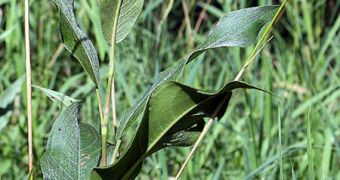In the Victorian epoch, a large number of aristocrats in the United Kingdom purchased Japanese knotweed from the Far East, in a bid to decorate their homes and gardens with more exotic plants. The plan soon backfired, as the knotweed soon moved out of gardens, and into the wild. Since then, they have been spreading across the country at very high speeds, and is estimated that the industry founded to eradicate it now costs the British economy in excess of 150 million pounds each year. Now, authorities have sanctioned a plan to introduce a new species into the wild to feast on the plant.
A careful review of the many species of creatures that are natural predators of the knotweeds revealed that a type of small, plant-eating insect, called Aphalara itadori, was the best solution to this problem. The creatures are extremely apt at keeping this particular pest in check, as they have been doing it in Japan for countless centuries. In the Asian nation, the knotweed never grows out of control, as it is always kept at acceptable levels by many factors. However, in the United Kingdom, it has no rival, and it's destroying other vegetation, and also crops, on a daily basis.
It is extremely hardy and solid, and has the ability to pass through both tarmac and concrete if it wants to. It can easily destroy the foundation of buildings and roads, and costs associated with eradicating it, and fixing the damages it causes, soar annually. To make matter even worse, it grows extremely fast, by about one meter per month. This means that an area that has been purged of the pest can get covered back again within less than a month or two. This makes the effort of British authorities rather useless.
“In the early stages, a contingency plan is in place so that should, in the unlikely event, any unintended consequences be detected, we will be able to do something about it. Insecticide and herbicide treatment will be on standby for rapid response. On the localized sites, I would expect to see damaged knotweed this season. However, biocontrol is a long-term strategy – it could take five to 10 years to have a real impact. Safety is our top priority. We are lucky that we do have an extremely specific agent - it just eats invasive knotweeds,” says the lead researcher on the new project, Dr Dick Shaw. He is an expert at the agricultural research organization Cabi, who proposed and tested the new control method at various sites, the BBC News reports.

 14 DAY TRIAL //
14 DAY TRIAL //